外研版九年级英语上册Module 9 Unit 1 Will computers be used more than books in the future?教学课件(共33张PPT)
文档属性
| 名称 | 外研版九年级英语上册Module 9 Unit 1 Will computers be used more than books in the future?教学课件(共33张PPT) |
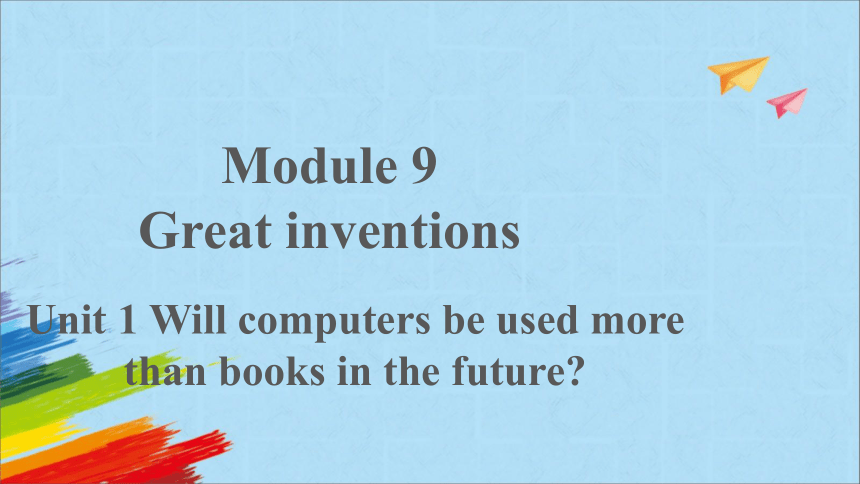
|
|
| 格式 | pptx | ||
| 文件大小 | 3.0MB | ||
| 资源类型 | 教案 | ||
| 版本资源 | 外研版 | ||
| 科目 | 英语 | ||
| 更新时间 | 2022-10-16 09:23:31 | ||
图片预览

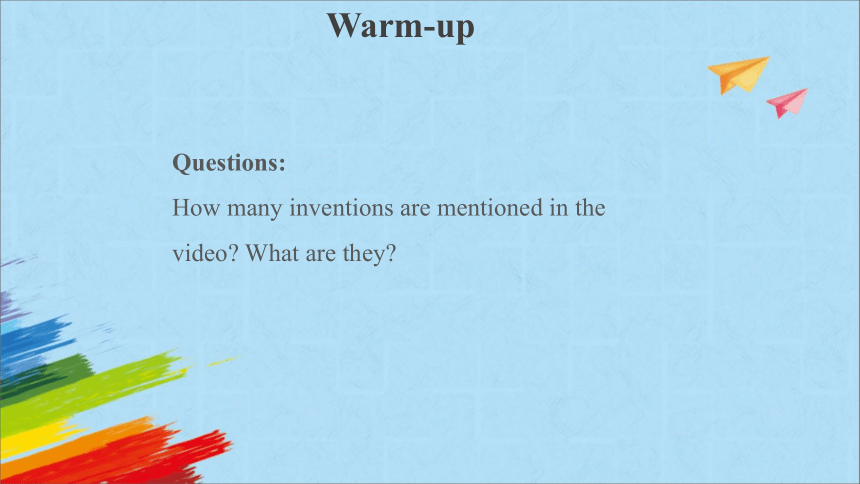
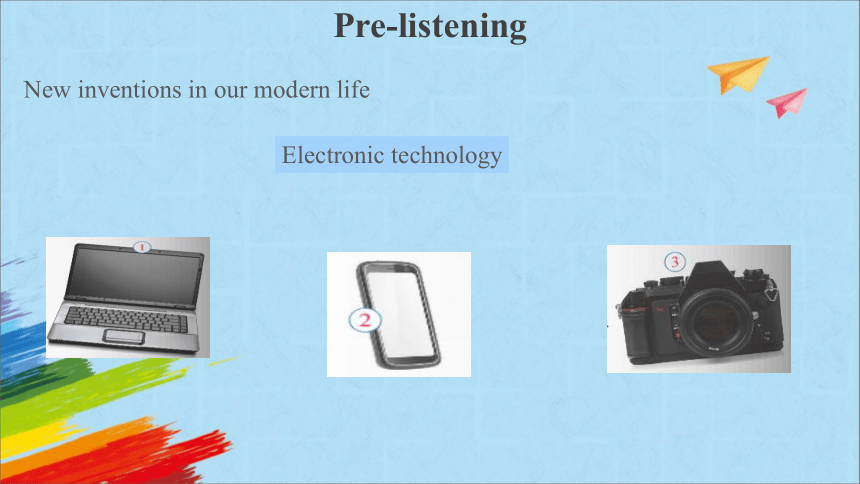
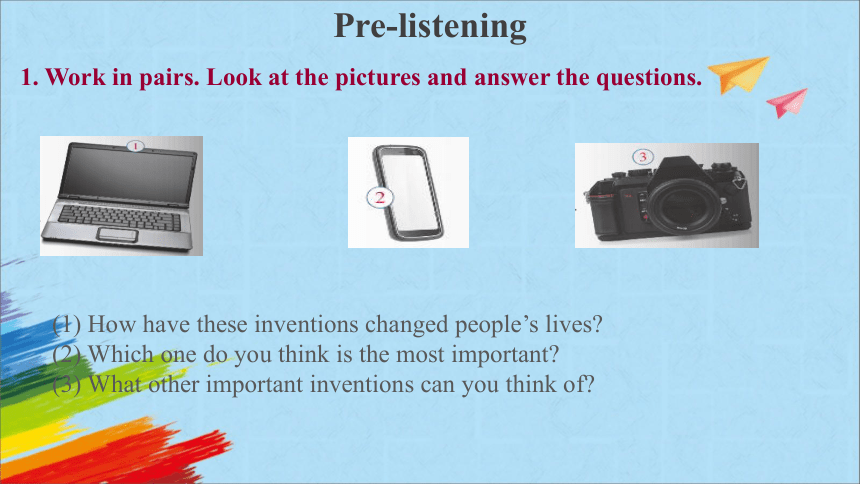
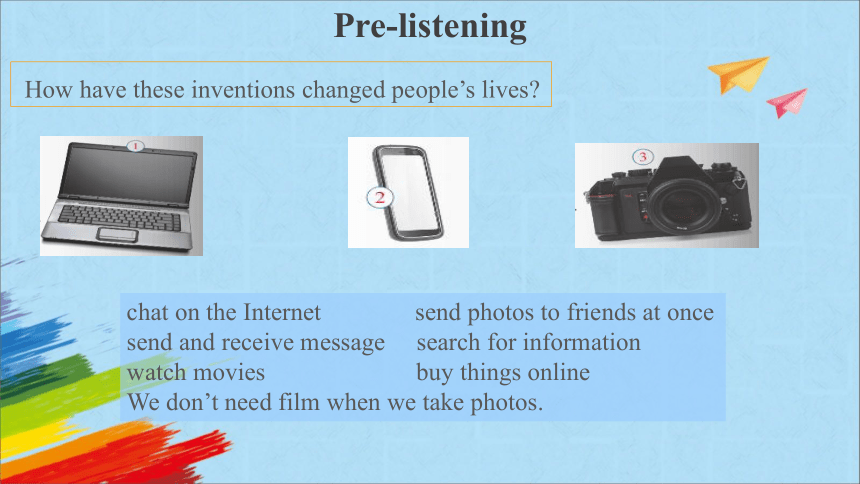

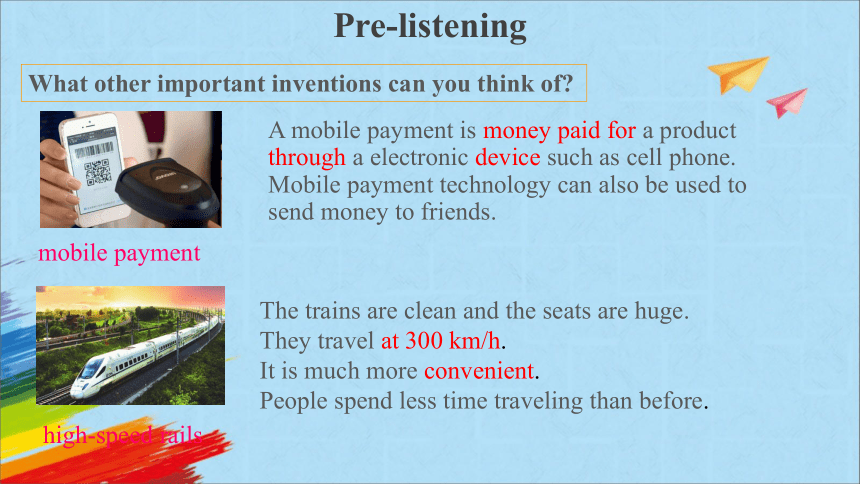
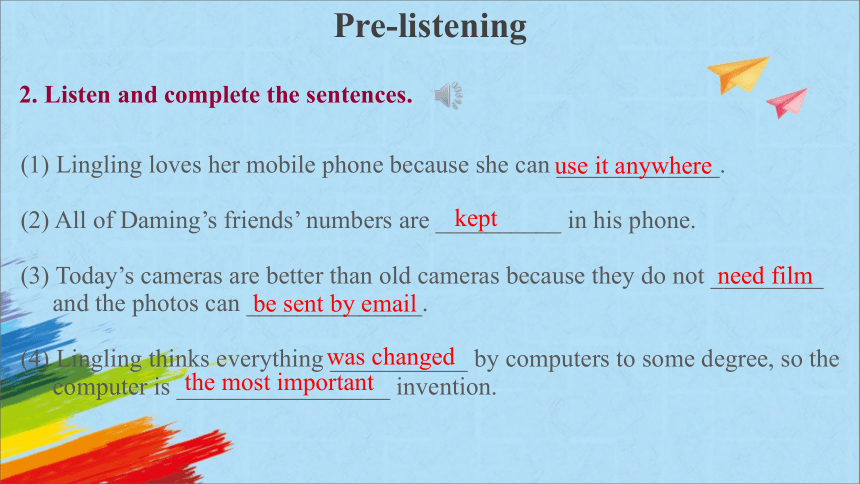
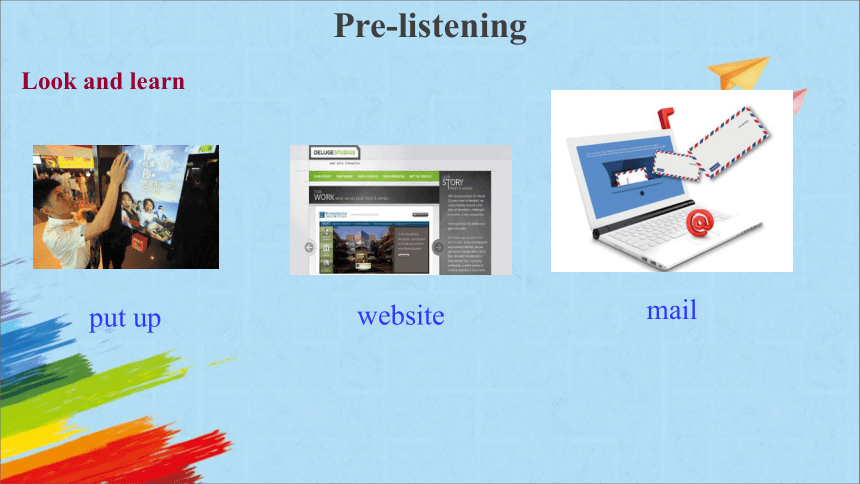
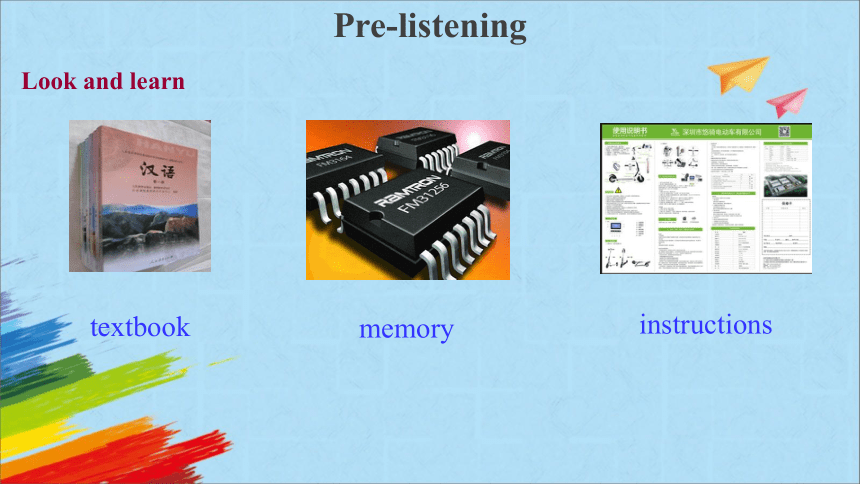
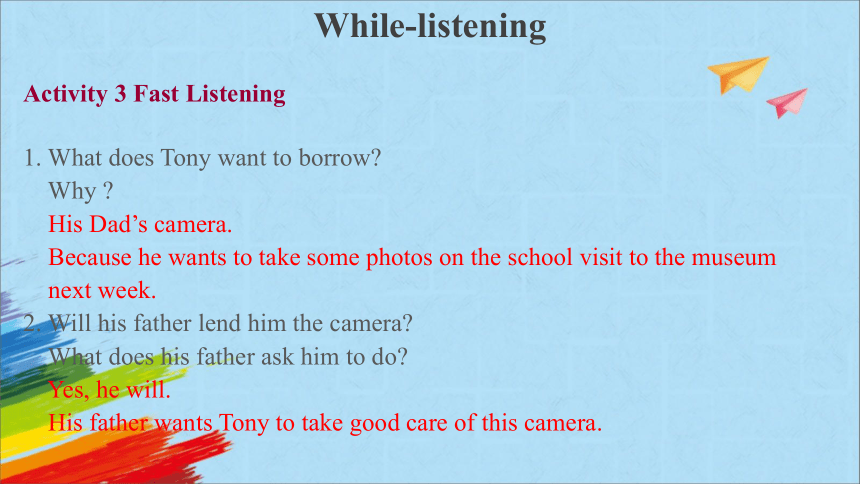
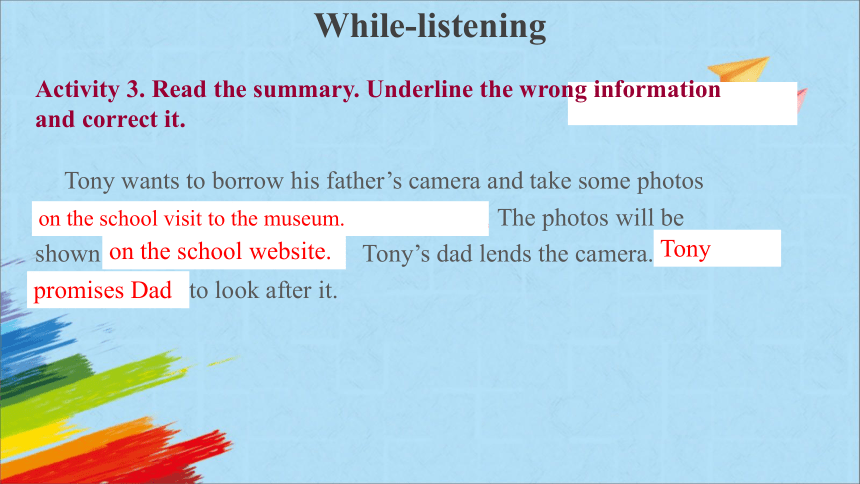
文档简介
(共33张PPT)
Module 9
Great inventions
Unit 1 Will computers be used more than books in the future
Warm-up
Questions:
How many inventions are mentioned in the video What are they
New inventions in our modern life
Electronic technology
Pre-listening
1. Work in pairs. Look at the pictures and answer the questions.
(1) How have these inventions changed people’s lives
(2) Which one do you think is the most important
(3) What other important inventions can you think of
Pre-listening
How have these inventions changed people’s lives
chat on the Internet send photos to friends at once
send and receive message search for information
watch movies buy things online
We don’t need film when we take photos.
Pre-listening
chat on the Internet send photos to friends at once
send and receive message search for information
watch movies buy things online
We don’t need film when we take photos
In a word, these inventions play an important part in our everyday life.
Pre-listening
What other important inventions can you think of
mobile payment
A mobile payment is money paid for a product through a electronic device such as cell phone. Mobile payment technology can also be used to send money to friends.
The trains are clean and the seats are huge.
They travel at 300 km/h.
It is much more convenient.
People spend less time traveling than before.
high-speed rails
Pre-listening
2. Listen and complete the sentences.
(1) Lingling loves her mobile phone because she can _____________.
(2) All of Daming’s friends’ numbers are __________ in his phone.
(3) Today’s cameras are better than old cameras because they do not _________ and the photos can ______________.
(4) Lingling thinks everything ___________ by computers to some degree, so the computer is _________________ invention.
use it anywhere
kept
need film
be sent by email
was changed
the most important
Pre-listening
put up
website
mail
Look and learn
Pre-listening
textbook
memory
instructions
Pre-listening
Look and learn
Activity 3 Fast Listening
1. What does Tony want to borrow
Why
His Dad’s camera.
Because he wants to take some photos on the school visit to the museum
next week.
2. Will his father lend him the camera
What does his father ask him to do
Yes, he will.
His father wants Tony to take good care of this camera.
While-listening
Tony wants to borrow his father’s camera and take some photos of the school dance and the basketball match. The photos will be shown in the school magazine. Tony’s dad lends the camera. He promises Tony to look after it.
on the school visit to the museum.
on the school website.
Activity 3. Read the summary. Underline the wrong information and correct it.
promises Dad
Tony
While-listening
In the past:
Today:
We waited for weeks to hear from our pen friends abroad.
We can send and receive photos and mails on the Internet.
In the past:
Today:
We mainly got information from paper books.
On the Internet (more powerful).
1. How to keep in touch with friends
2. How to get information
Activity 3 Careful Listening
While-listening
4. Find the sentences in the conversation which mean:
Changing the subject, can I get the camera
(2) It is not a problem. I will use another memory card.
(3) I will do what you tell me to do.
Anyway, about the camera
OK. That can be fixed. I’ve got an empty memory card.
Promise!
While-listening
(1) How do you fix a camera if the memory is full
(2) When do you need to read the instructions
(3) How often do you send messages by mail
(4) How many pages does this book have
(5) Which website do you often go to when you get online
(6) What is an example of electronic technology
(7) When you lend something to someone, what do they have to do later
(8) What do you think is the most important invention in human history
5. Answer the questions.
electronic fix instruction invention lend mail page website
While-listening
(1) How do you fix a camera if the memory card is full
(2) When do you need to read the instructions
(3) How often do you send messages by mail
(4) How many pages does this book have
If my memory card is full, I will copy some pictures to my computer.
I need to read the instructions before I use a new machine.
I send messages by mail every day.
This book has 162 pages.
While-listening
(5) Which website do you often go to when you get online
(6) What is an example of electronic technology
(7) When you lend something to someone, what do they have to do later
(8) What do you think is the most important invention in human history
Camera is an example of electronic technology.
They should take good care of it before they give it back to me.
I think computer is the most important invention in human history.
I often go to www. when I get online.
While-listening
1. They’ll be put up on the school website.
2. Will computers be used more than books in the future
3. And they can be seen on the Internet by other classes.
Read the dialogue and find out the sentences which belong to the passive voice.
Post-listening
Grammar
一般将来时的被动语态:
主语 + will/be (am/is/are) going to + be + done
Post-listening
1. They’ll be put up on the school website.
2. Will computers be used more than books in the future
3. And they can be seen on the Internet by other classes.
含有情态动词的被动语态:
主语 + 情态动词 + be + done
1. They’ll be put up on the school website.
它们(照片)将被公布在学校的网站上。
put up的意思是“张贴;公布;挂起”。
You can put up the notice on the noticeboard.
你可以把通知贴在布告栏上。
We’ve put up some new curtains in the living room.
我们在客厅里挂了一些新窗帘。
Language Points
Post-listening
2. Some were huge ones with thousands of pages.
有的书甚至有几千页厚。
thousands of 的意思是“成千上万的;数以千计的”,不能和数词连用。
Thousands of people lost their homes in the earthquake.
在地震中,成千上万的人失去了他们的家园。
______ trees were planted on the mountain last year.
A. Thousands of
B. Thousand of
C. Five thousand of
D. Five thousands
Post-listening
3. If you have to lend it to anyone, tell them to use it properly.
如果一定要借给其他人的话,你要告诉他们如何正确使用它。
Can you lend me your bike = Can you lend your bike to me
你能把你的自行车借给我吗?
lend作动词,意为“借给”,强调“借出”。
常用短语lend sb. sth.相当于lend sth. to sb.,意为“把某物借给某人”。
Post-listening
— Peter, can you _______ twenty yuan ______ me I want to buy a new pen.
— Of course.
A. lends; from B. borrow; to
C. borrow; from D. lend; to
lend反义词borrow意为“借;借用”,强调“借入”。
常用短语为borrow sth. from sb./sp.,意思是“从某人/某地借来某物”。
Can I borrow a book from the library at weekends
我周末可以从图书馆借本书吗?
Post-listening
4. But today, we can send and receive photos and mails on the
Internet, and it’s really fast.
但今天,我们可以在互联网上收发照片和邮件,而且速
度非常快。
We haven’t received Sam’s letter for a long time.
我们很久没有收到萨姆的来信了。
receive作动词,意为“收到”。
Post-listening
单词 意义 解析 例句
receive 收到;接收 表示客观上收到,但不一定愿意接受 When Bill woke up the next day, he received a lot of text messages.
accept 接受;收受 表示主观上愿意接受 Lily was quite satisfied with the boy so she accepted the small gift.
Eric asked the girl to marry him and
the girl accepted.
The man received a letter from his friend.
receive(客观上)收到
accept(主观上)接受
辨析:receive和accept
Post-listening
一些长的句子需要按照意思的群落(即“意群”)适当断开、稍加停顿(即“停顿”),断开的几部分都具有相对完整的意思。按照一般语法结构,可划分为以下意群单位:
1.短句 2.名词短语
3.介词/不定式/分词短语
4.动词短语 5.主谓结构
6.动宾结构 7.系表结构
8.动状结构 9.主句-从句
Pronunciation and speaking
Post-listening
(1) They’ll be put up on the school website. And they can be seen on the Internet by other classes, even people living in other countries.
(2) You must promise that you’ll take good care of it.
6. Listen and mark the pauses.
Now listen again and repeat.
∕
∕
∕
Post-listening
7. Work in pairs. Talk about the advantages of these inventions.
— We can use email to send messages.
— Yes, we can use email to send messages quickly and cheaply.
email mobile phone TV washing machine
— We can use mobile phone to contact others.
— Yes, we can talk with anyone at any time.
Post-listening
— We can use TV to get a lot of information.
— Yes, we can use TV to know what is happening in other places.
email mobile phone TV washing machine
— We can use washing machine to wash our clothes.
— Yes, we can easily make our clothes clean.
7. Work in pairs. Talk about the advantages of these inventions.
Post-listening
Mobile phone has great influence on my life…
Now describe how these inventions have influenced your life.
Post-listening
Grammar
一般将来时的被动语态:
主语 + will/be (am/is/are) going to + be + done
Summary
1. They’ll be put up on the school website.
2. Will computers be used more than books in the future
3. And they can be seen on the Internet by other classes.
含有情态动词的被动语态:
主语 + 情态动词 + be + done
Homework
1. Listen and read the passage in Activity 3.
2. Finish your passage in Activity 7.
Goodbye!
Module 9
Great inventions
Unit 1 Will computers be used more than books in the future
Warm-up
Questions:
How many inventions are mentioned in the video What are they
New inventions in our modern life
Electronic technology
Pre-listening
1. Work in pairs. Look at the pictures and answer the questions.
(1) How have these inventions changed people’s lives
(2) Which one do you think is the most important
(3) What other important inventions can you think of
Pre-listening
How have these inventions changed people’s lives
chat on the Internet send photos to friends at once
send and receive message search for information
watch movies buy things online
We don’t need film when we take photos.
Pre-listening
chat on the Internet send photos to friends at once
send and receive message search for information
watch movies buy things online
We don’t need film when we take photos
In a word, these inventions play an important part in our everyday life.
Pre-listening
What other important inventions can you think of
mobile payment
A mobile payment is money paid for a product through a electronic device such as cell phone. Mobile payment technology can also be used to send money to friends.
The trains are clean and the seats are huge.
They travel at 300 km/h.
It is much more convenient.
People spend less time traveling than before.
high-speed rails
Pre-listening
2. Listen and complete the sentences.
(1) Lingling loves her mobile phone because she can _____________.
(2) All of Daming’s friends’ numbers are __________ in his phone.
(3) Today’s cameras are better than old cameras because they do not _________ and the photos can ______________.
(4) Lingling thinks everything ___________ by computers to some degree, so the computer is _________________ invention.
use it anywhere
kept
need film
be sent by email
was changed
the most important
Pre-listening
put up
website
Look and learn
Pre-listening
textbook
memory
instructions
Pre-listening
Look and learn
Activity 3 Fast Listening
1. What does Tony want to borrow
Why
His Dad’s camera.
Because he wants to take some photos on the school visit to the museum
next week.
2. Will his father lend him the camera
What does his father ask him to do
Yes, he will.
His father wants Tony to take good care of this camera.
While-listening
Tony wants to borrow his father’s camera and take some photos of the school dance and the basketball match. The photos will be shown in the school magazine. Tony’s dad lends the camera. He promises Tony to look after it.
on the school visit to the museum.
on the school website.
Activity 3. Read the summary. Underline the wrong information and correct it.
promises Dad
Tony
While-listening
In the past:
Today:
We waited for weeks to hear from our pen friends abroad.
We can send and receive photos and mails on the Internet.
In the past:
Today:
We mainly got information from paper books.
On the Internet (more powerful).
1. How to keep in touch with friends
2. How to get information
Activity 3 Careful Listening
While-listening
4. Find the sentences in the conversation which mean:
Changing the subject, can I get the camera
(2) It is not a problem. I will use another memory card.
(3) I will do what you tell me to do.
Anyway, about the camera
OK. That can be fixed. I’ve got an empty memory card.
Promise!
While-listening
(1) How do you fix a camera if the memory is full
(2) When do you need to read the instructions
(3) How often do you send messages by mail
(4) How many pages does this book have
(5) Which website do you often go to when you get online
(6) What is an example of electronic technology
(7) When you lend something to someone, what do they have to do later
(8) What do you think is the most important invention in human history
5. Answer the questions.
electronic fix instruction invention lend mail page website
While-listening
(1) How do you fix a camera if the memory card is full
(2) When do you need to read the instructions
(3) How often do you send messages by mail
(4) How many pages does this book have
If my memory card is full, I will copy some pictures to my computer.
I need to read the instructions before I use a new machine.
I send messages by mail every day.
This book has 162 pages.
While-listening
(5) Which website do you often go to when you get online
(6) What is an example of electronic technology
(7) When you lend something to someone, what do they have to do later
(8) What do you think is the most important invention in human history
Camera is an example of electronic technology.
They should take good care of it before they give it back to me.
I think computer is the most important invention in human history.
I often go to www. when I get online.
While-listening
1. They’ll be put up on the school website.
2. Will computers be used more than books in the future
3. And they can be seen on the Internet by other classes.
Read the dialogue and find out the sentences which belong to the passive voice.
Post-listening
Grammar
一般将来时的被动语态:
主语 + will/be (am/is/are) going to + be + done
Post-listening
1. They’ll be put up on the school website.
2. Will computers be used more than books in the future
3. And they can be seen on the Internet by other classes.
含有情态动词的被动语态:
主语 + 情态动词 + be + done
1. They’ll be put up on the school website.
它们(照片)将被公布在学校的网站上。
put up的意思是“张贴;公布;挂起”。
You can put up the notice on the noticeboard.
你可以把通知贴在布告栏上。
We’ve put up some new curtains in the living room.
我们在客厅里挂了一些新窗帘。
Language Points
Post-listening
2. Some were huge ones with thousands of pages.
有的书甚至有几千页厚。
thousands of 的意思是“成千上万的;数以千计的”,不能和数词连用。
Thousands of people lost their homes in the earthquake.
在地震中,成千上万的人失去了他们的家园。
______ trees were planted on the mountain last year.
A. Thousands of
B. Thousand of
C. Five thousand of
D. Five thousands
Post-listening
3. If you have to lend it to anyone, tell them to use it properly.
如果一定要借给其他人的话,你要告诉他们如何正确使用它。
Can you lend me your bike = Can you lend your bike to me
你能把你的自行车借给我吗?
lend作动词,意为“借给”,强调“借出”。
常用短语lend sb. sth.相当于lend sth. to sb.,意为“把某物借给某人”。
Post-listening
— Peter, can you _______ twenty yuan ______ me I want to buy a new pen.
— Of course.
A. lends; from B. borrow; to
C. borrow; from D. lend; to
lend反义词borrow意为“借;借用”,强调“借入”。
常用短语为borrow sth. from sb./sp.,意思是“从某人/某地借来某物”。
Can I borrow a book from the library at weekends
我周末可以从图书馆借本书吗?
Post-listening
4. But today, we can send and receive photos and mails on the
Internet, and it’s really fast.
但今天,我们可以在互联网上收发照片和邮件,而且速
度非常快。
We haven’t received Sam’s letter for a long time.
我们很久没有收到萨姆的来信了。
receive作动词,意为“收到”。
Post-listening
单词 意义 解析 例句
receive 收到;接收 表示客观上收到,但不一定愿意接受 When Bill woke up the next day, he received a lot of text messages.
accept 接受;收受 表示主观上愿意接受 Lily was quite satisfied with the boy so she accepted the small gift.
Eric asked the girl to marry him and
the girl accepted.
The man received a letter from his friend.
receive(客观上)收到
accept(主观上)接受
辨析:receive和accept
Post-listening
一些长的句子需要按照意思的群落(即“意群”)适当断开、稍加停顿(即“停顿”),断开的几部分都具有相对完整的意思。按照一般语法结构,可划分为以下意群单位:
1.短句 2.名词短语
3.介词/不定式/分词短语
4.动词短语 5.主谓结构
6.动宾结构 7.系表结构
8.动状结构 9.主句-从句
Pronunciation and speaking
Post-listening
(1) They’ll be put up on the school website. And they can be seen on the Internet by other classes, even people living in other countries.
(2) You must promise that you’ll take good care of it.
6. Listen and mark the pauses.
Now listen again and repeat.
∕
∕
∕
Post-listening
7. Work in pairs. Talk about the advantages of these inventions.
— We can use email to send messages.
— Yes, we can use email to send messages quickly and cheaply.
email mobile phone TV washing machine
— We can use mobile phone to contact others.
— Yes, we can talk with anyone at any time.
Post-listening
— We can use TV to get a lot of information.
— Yes, we can use TV to know what is happening in other places.
email mobile phone TV washing machine
— We can use washing machine to wash our clothes.
— Yes, we can easily make our clothes clean.
7. Work in pairs. Talk about the advantages of these inventions.
Post-listening
Mobile phone has great influence on my life…
Now describe how these inventions have influenced your life.
Post-listening
Grammar
一般将来时的被动语态:
主语 + will/be (am/is/are) going to + be + done
Summary
1. They’ll be put up on the school website.
2. Will computers be used more than books in the future
3. And they can be seen on the Internet by other classes.
含有情态动词的被动语态:
主语 + 情态动词 + be + done
Homework
1. Listen and read the passage in Activity 3.
2. Finish your passage in Activity 7.
Goodbye!
同课章节目录
- Module 1 Wonders of the world
- Unit 1 It's more than 2,000 years old.
- Unit 2 The Grand Canyon was not just big.
- Unit 3 Language in use
- Module 2 Public holidays
- Unit 1 My family always go somewhere interesting a
- Unit 2 We have celebrated the festival since the f
- Unit 3 Language in use
- Module 3 Heroes
- Unit 1 She trained hard,so she became a great play
- Unit 2There were few doctors, so he had to work ve
- Unit 3 Language in use
- Module 4 Home alone
- Unit 1 I can look after myself, although it won’t
- Unit 2 I became so bored with their orders that I
- Unit 3 Language in use
- Module 5 Museums
- Unit 1 Don't cross that rope!
- Unit 2 If you ever go to London, make sure you vis
- Unit 3 Language in use
- Module 6 Problems
- Unit 1 If I start after dinner, I'll finish it be
- Unit 2 If you tell him the truth now, you will sho
- Unit 3 Language in use
- Revision Module A
- Module 7 Great books
- Unit 1 We're still influenced by Confucius's idea
- Unit 2 It is still read and loved.
- Unit 3 Language in use
- Module 8 Sports life
- Unit 1 Daming wasn't chosen for the team last time
- Unit 2 He was invited to competitions around the w
- Unit 3 Language in use
- Module 9 Great inventions
- Unit 1 Will computers be used more than books in t
- Unit 2 Will books be replaced by the Internet?
- Unit 3 Language in use
- Module 10 Australia
- Unit 1 I have some photos that I took in Australia
- Unit 2 The game that they like most is Australian
- Unit 3 Language in use
- Module 11 Photos
- Unit 1 He's the boy who won the photo competition
- Unit 2 The photo which we liked best was taken by
- Unit 3 Language in use
- Module 12 Save our world
- Unit 1 If everyone starts to do something, the wor
- Unit 2 Repeat these three words daily: reduce, reu
- Unit 3 Language in use
- Revision Module B
